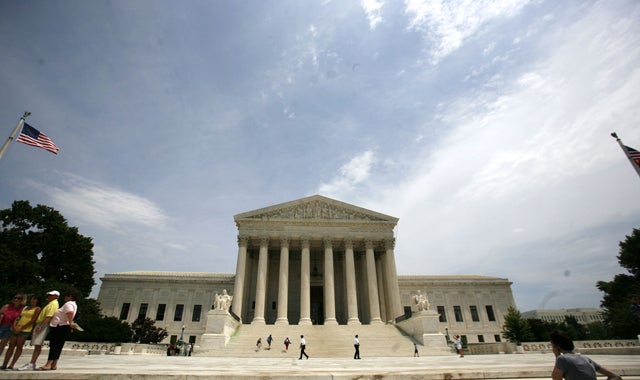Supreme Court Strikes a Blow to State Court Bias
Paul J. Larkin / Hans von Spakovsky /
In a unanimous opinion yesterday by Justice Stephen Breyer in Standard Fire Ins. Co. v. Knowles, the Supreme Court concluded that plaintiffs’ attorneys can’t evade federal law on class action lawsuits through a self-serving stipulation designed to keep a case in state court and out of the federal system.
Like most vehicles in the law, class action lawsuits have benefits and costs. The benefit is that a class action lawsuit allows a large number of meritorious cases to be filed that otherwise would never have been brought due to the small dollar value at issue in each case.
The cost is that the potential for massive liability, both in compensatory and punitive damages, can pressure a defendant into settling an otherwise meritless case. This is something that plaintiffs’ lawyers take advantage of all too often, particularly when they can get a case out of federal hands and into state court. State courts often lack some of the procedural protections of the federal system, and there is always some risk that state court judges will favor local plaintiffs and their local, well-connected lawyers when they sue an out-of-state defendant. Lawyers for such defendants call it getting “home cooked.”
In 2005, Congress concluded that the risk of defendants suffering large-scale liability in meritless class actions filed in local state courts justified allowing the defendants to remove some of those cases to federal district court. The Class Action Fairness Act of 2005 (CAFA) vests federal district courts with original jurisdiction when the damages being sought by plaintiffs exceed $5 million.
But in the Knowles case, which involved general contractor fees under homeowner’s insurance issued by the Standard Fire Insurance Company, Justice Breyer held that counsel for the lead plaintiff couldn’t evade the CAFA jurisdictional prerequisite by stipulating—before a class action lawsuit was even certified—that the plaintiffs would not seek damages greater than $5 million.
Breyer’s reasoning was simple and straightforward: Because a class representative cannot bind potential future class members before a class action is certified, the counsel’s stipulation bound only Knowles, not potential future class members. Given the nature of the alleged wrong, the total amount of damages could exceed $5 million, so the federal district court properly had jurisdiction over the case and it should not have been remanded to state court.
The issue that the Court resolved yesterday was easy compared to the issue that eventually may reach the Court: Suppose a state court class action is filed that seeks less than $5 million in damages. A state court judge certifies the case as a class action, but rules that the plaintiffs may recover more than $5 million in damages, effectively changing the class action complaint. Can a defendant then remove the case to federal district court because the state court judge’s ruling has so transformed the initial case that it amounts for all practical purposes to a new, different, and second lawsuit worth more than $5 million?
The traditional rule, reiterated by the Supreme Court yesterday, is that federal court jurisdiction is determined at the time that a complaint is first filed, so a federal court ordinarily must examine a state court complaint when it was filed to decide if the case can be removed to federal court. But if a state court judge goes so far as to change the complaint by allowing a defendant to be socked with more than $5 million in damages, the risk of trial before a state court biased toward local plaintiffs—a risk that Congress sought to avoid through the CAFA removal provision—could become a reality.
Congress wanted to ensure that where more than $5 million was at stake in a class action, the defendant would have the right to remove the case to federal district court. It is dubious that Congress would have concluded that there should be an exception to that right when a state court judge manipulates state rules of procedure materially to change a filed complaint. The CAFA, not surprisingly, contains no exception for such state court shenanigans, and it would be surprising to see the federal courts overlook them.
Perhaps this problem never will arise given the Court’s opinion yesterday, which hints that the Court would not approve such a move. But if such a case does arise, hopefully the Supreme Court will not approve such a maneuver either.

